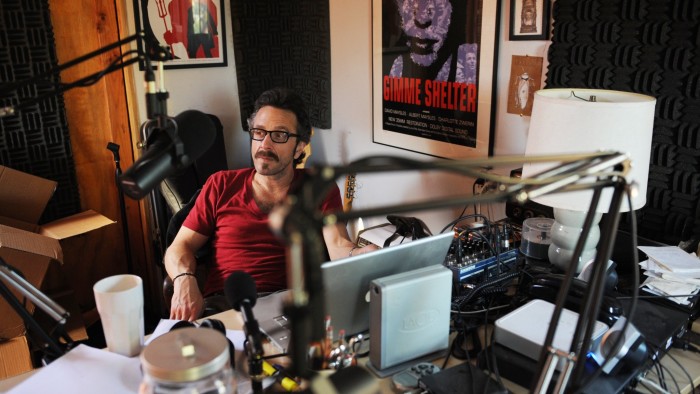From interviews to eavesdropping, the conversations continue

Simply sign up to the Life & Arts myFT Digest -- delivered directly to your inbox.
One-on-one interview programmes have been among the most successful in the history of radio. BBC Radio 4’s hugely popular Desert Island Discs was conceived by freelance broadcaster Roy Plomley late one evening in 1941. In his pyjamas, he dashed off his simple pitch in a letter: interviewees would be stranded on a fictional desert island, and asked which eight records “would you choose to have with you, assuming of course, that you had a gramophone and an inexhaustible supply of needles”.
Far outliving the days of the gramophone, the show has continued more or less uninterrupted in this form since it was first broadcast. Now, half of Desert Island Disc’s archive of nearly 3,000 programmes are available as podcasts, and it regularly tops the download charts.
Fashioning a narrative arc from a person’s life story by combining personal interviews with their favourite music is a clever strategy; the music shortcuts to recollections and emotions that are difficult to draw from a stranger in a single short interview. Radio 3’s Private Passions also punctuates its interviews with music chosen by guests, who are not musicians but people for whom music has been especially important. Although host Michael Berkeley is not a psychiatrist but a composer, the combination of music and autobiography is effective in giving both personal and professional insight.
Discussions with a host who relates to a guest’s experience can seem as enlightening for the person being interviewed as for the listener. Actor Alec Baldwin presents WNYC’s Here’s The Thing, conversations with performers and policymakers. First-hand knowledge of celebrity, as well an actor’s ability to get under the skin of a character, makes Baldwin an adept interviewer. (When his latest guest Paul Simon struggled to remember the name of a film one of his songs was used in, Baldwin casually offered the answer, The Royal Tenenbaums, which he narrated). He has the confidence to keep on probing until he gets to the show’s basic purpose: “I want people to describe to me how has it felt to be you,” he told a defensive Simon.
Some prior knowledge of the interviewee adds to listeners’ enjoyment, so podcasts have been a great outlet for shows long consigned to the archives. In the Psychiatrist’s Chair, in which guests, from actors to double agents, opened up to Dr Anthony Clare, ran from 1982 to 2001 and is now available as a podcast. A candid early interview with a frustrated, contemplative Stephen Fry from 1997 contrasts with the Fry that appeared this June on Desert Island Discs, basking in post-honeymoon happiness.
The team from Longform.org, a site that recommends the best non-fiction articles from across the web, turn the tables with their Longform podcast. Each week they release interviews with non-fiction writers — Ta-Nehesi Coates, Gay Talese, Malcolm Gladwell have been guests — that are informed by the interviewers’ own experiences as journalists. Although useful for professional or aspiring writers (they often cover practical aspects such as working routines, how they got their start, where they find their sources) it has enough autobiographical narrative to make it compelling regardless.
Listening habits have changed substantially since the first episodes of Desert Island Discs, which would have been read from a script. Podcasts that play on a sense of eavesdropping are among the most popular. Call Your Girlfriend has more in common with the meandering prattle of a Skype chat then the kind of interview most journalists would have been schooled in. Three friends record breezy conversations that have a millennial’s wide reach, taking on repartitions, Obamacare, Beyoncé and the merits of the kaftan in one episode. Also going against the idea that subjects need to be well known is Getting Better Acquainted, which began as Dave Pickering’s quest to improve his interviewing and listening technique by practising on his friends. Episodes are often just listed by the guest’s first names, and start with the question “How do you know me?”
Stand-up comic Marc Maron has been surprised by the success of WTF, in which he interviews celebrities, mainly other comedians, from his garage in LA — a reflection of his unscripted, under-researched style. “You kind of feel like he might lose the tape on the way home,” said one guest, film producer Judd Apatow. But this is also his strength. “What helps him is the fact that people mistakenly think that no one is going to listen to it, when in fact a ton of people listen to it, and it will last for ever.”
The highest authority has confirmed Apatow’s theory. In June, Barack Obama sat down at the microphone in Maron’s home studio. “Increasingly I’ve spent my time thinking about how do I try to break out of these old patterns that our politics has fallen into,” the president told him. “Which is part of the reason I’m here. How do we talk to folks that aren’t already so dug in to a particular way of thinking about politics? How do we create more space for people to have a normal, ordinary conversation?” Podcasts seem to have provided the White House with an answer.
Listen to an FT podcast about the ‘podcast renaissance’
Comments